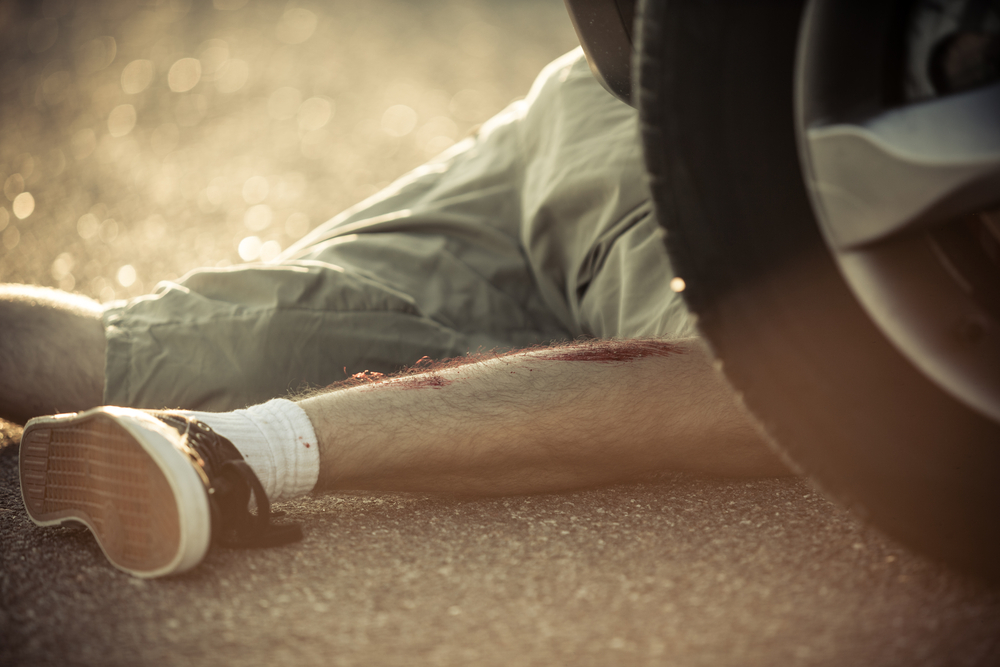As the victim of a hit and run accident, you may have legal rights to compensation. The steps you take after getting hurt in a hit and run can have a significant effect on those rights and your financial future.
After a hit and run accident, there are specific steps you should take to protect your interests and recover the maximum compensation possible for your losses after a hit and run. We also discuss the critical role a skilled hit and run car accident lawyer in Atlanta can play in handling your case.
Schedule a Free Initial Consultation Today!
Overview of Hit and Run Accidents

Hit and run accidents are all too common on U.S. roads. As the name suggests, they involve motor vehicle collisions in which one of the parties illegally leaves the scene without stopping to identify themselves or render aid to the other party. A hit and run accident can include various collisions, from blows between a moving car and a parked one to violent collisions between two vehicles in motion.
A hit and run accident can inflict severe injuries and property damage. Common injuries in hit and runs can include traumatic brain injuries, spinal cord damage, broken bones, contusions, whiplash, and emotional trauma, such as post-traumatic stress disorder. You might also experience extensive property damage, particularly to your vehicle, which could require costly repairs or total replacement.
Two Steps You Should Take Right Away
You must immediately act after a hit and run accident. If you have not taken these two steps yet, drop everything and do them immediately. Any delay in completing them could substantially impair your legal rights.
Seek Necessary Medical Attention
Your health takes priority. Seek medical attention as soon as possible after a hit and run accident, even if you think you avoided severe injury. Trauma does not always show immediate symptoms, and only a qualified medical professional can assess your condition accurately. In addition to protecting your health and well-being, getting care can be vital in any future legal action. A doctor's documentation of your injuries can constitute essential evidence in proving your claim for damages.
Contact Law Enforcement and File an Accident Report
Aside from addressing your immediate medical needs, your second most pressing priority should be to contact law enforcement and file an accident report. In most states, traffic laws require you to report a hit and run immediately.
Regardless of that requirement, alerting the authorities is essential to preserving your legal rights to compensation. Once you report the hit and run, the police can start an investigation, which increases your chances of identifying the driver and holding them accountable for your losses.
Next Steps: Reporting the Hit and Run to Your Insurance Company
After taking care of immediate health concerns and reporting the incident to the police, the next critical step is to inform your auto insurance company about the hit and run accident. Many auto insurance policies provide two forms of coverage that can be extremely beneficial after a hit and run. One is collision coverage, which can pay for repairing or replacing your damaged vehicle, regardless of who was at fault.
The other, uninsured/underinsured motorist coverage, pays your accident-related damages if you do not identify the hit and run driver or if they do not have adequate insurance—two common scenarios in hit and run accidents.
Most auto insurance policies require the policyholder (you) to report any accident, especially a hit and run, as soon as possible. Delaying this step could potentially jeopardize your right to make a claim or cause your insurer to question your claim's validity.
When you report the hit and run to your insurance company, stick to the facts. Avoid getting drawn into a discussion of fault or liability. Don't say things that your insurer could misinterpret as you blaming yourself, such as "I'm so sorry" or "I should have seen it coming."
At this stage, the goal is to notify your insurer that the accident happened, you suffered injuries and sought medical care, and you reported the hit and run to the police (if your insurer asks for a copy of the police report, your lawyer can obtain and send it to them). Leave questions of fault and liability for the accident to your lawyer to discuss with the insurance company on your behalf.
This can be a complicated topic, and anything you say about it could harm your interests by giving the insurer reasons to limit or deny your eventual claim.
Next Steps: Contacting an Experienced Hit and Run Accident Lawyer
After reporting the incident to your insurance company, your next important step should be to reach out to a seasoned hit and run accident lawyer. The sooner you contact an experienced attorney, the better your chances of securing money to pay your expenses and recover from the trauma of a hit and run.
Car accident victims generally have legal rights to obtain compensation from the party (or parties) at fault for a crash. This compensation can potentially cover medical bills, loss of earnings and job benefits, pain and suffering, and other damages.
Obtaining that complication can be challenging in hit and run scenarios, however. The primary obstacle you might face is not knowing—and potentially never knowing—the hit and run driver's identity.
Absent an identifiable at-fault driver, you may have to turn to your insurance company to cover your losses. This often involves proving to your insurer's satisfaction that you weren't at fault for what happened and the hit and run driver was.
This is where the skill and experience of a hit and run accident lawyer become critical to securing compensation for your losses. An experienced attorney can manage the legal and factual complexities of a hit and run accident injury claim on your behalf and maximize your chances of receiving full, fair payments from your insurer and any other liable parties.
A lawyer can:
- Conduct an independent investigation of the hit and run, separate from any police investigation, to identify the hit and run driver and determine if anyone else also faces liability for your losses.
- Evaluate the injuries you sustained in the hit and run and calculate the compensation you deserve to receive.
- Handle all interactions with relevant insurers to protect you from mistakes or missed deadlines that could undermine your claim.
- Answer your questions and advise you on decisions you need to make that could influence your legal rights and the outcome of your claim.
- Gather evidence to support your claim for compensation from your insurer or an at-fault party.
- Prepare and submit fully documented, persuasive claims to your auto insurer seeking compensation for your losses.
- File lawsuits against any identified at-fault party or insurer that fails to treat your claim fairly.
- Negotiate fair settlements of your lawsuits or insurance claims whenever possible.
- Take your claims to court to prove them to a judge and jury at trial when necessary.
- Follow through to ensure you receive the payments that insurers or at-fault parties owe you.
Hiring a lawyer immediately after you get hurt in a hit and run gives the lawyer the fullest opportunity to complete these steps and explore your options. Doing so can ensure the quick collection of important evidence and protect you from legal deadlines expiring and impairing your rights.
Hiring a Hit and Run Accident Injury Lawyer Is Affordable
In most hit and run situations, you won't have to spend a penny upfront to obtain the services of an experienced attorney.
Lawyers who represent hit and run accident victims almost always offer free consultations. During these sessions, they can discuss your case with you, offer a preliminary analysis of its potential outcomes, and explain your legal rights and options.
This risk-free meeting allows you to gain valuable information about your situation without committing financially. You'll never owe a penny for the time a legal professional spends with you in a consultation, even if you decide not to proceed with legal action.
Additionally, most hit and run accident lawyers work for their injured clients on a contingent fee basis. This means you do not pay any legal fees unless and until the lawyer successfully recovers compensation for your losses. The lawyer's fee is then a percentage of the recovery. You pay nothing upfront or while the case progresses. You only pay your lawyer if they get results.
Contingent fee arrangements align the interests of the attorney and the client: the more compensation the attorney gets for you, the higher their pay. This ensures that anyone, regardless of their financial status, can afford to hire a skilled attorney to fight for their legal rights after they suffer injuries in a hit and run.
What Not to Do After a Hit and Run
You must avoid certain pitfalls to preserve your rights and strengthen your hit and run accident case. Here are a few important things you should avoid after a hit and run accident.
Do Not Accept a Quick Settlement
Insurance companies are businesses that aim to save money. One way they do this is by offering crash victims like you a quick, lowball settlement soon after an accident, even before you've hired an attorney. While it can be tempting to accept this quick payout, especially if you're facing mounting medical bills and loss of income, it's almost always in your best interest to wait.
Accepting a quick settlement often means giving up your right to sue for additional damages if your injuries are more severe than you initially thought.
Leave settlement negotiations to a qualified hit and run accident attorney to handle on your behalf. A skilled lawyer can almost always get you far more than an insurance company initially puts on the table.
Do Not Delay Reporting or Seeking Legal Help
Time is of the essence after a hit and run accident. Delaying any step discussed above could make it more difficult for police to identify the hit and run driver, cause you to lose valuable evidence, risk missing legal deadlines, and arouse suspicion about your claim from your insurance company.
The sooner you report the accident to the police and your insurance company, the better. Seeking legal help immediately keeps your options open so you don't miss any critical steps or deadlines.
Do Not Assume You're Out of Luck if Police Can't Find the Hit and Run Driver

While it may seem like a lost cause if the police can't find the driver who hit you, remember that your auto insurance policy may cover your losses. An experienced accident attorney could also identify other liable parties, such as a government agency responsible for creating unreasonably hazardous road conditions that contributed to causing the hit and run.
Bear in mind that the process of recovering compensation can be complex, so it's always best to have a legal professional handling your claim as soon as possible.
Contact an Experienced Hit and Run Accident Injury Lawyer Today
Obtaining compensation for injuries you suffered in a hit and run accident can be more complicated than other accident scenarios, but it's not a lost cause. By hiring an experienced attorney to handle your claim, you stand as good a chance as anyone of securing the money you need to cover the costs of your care and recovery.
If you or someone you love recently sustained losses in a hit and run, don't delay getting the legal help you need. Contact an experienced hit and run accident injury lawyer immediately for a free case evaluation.




























